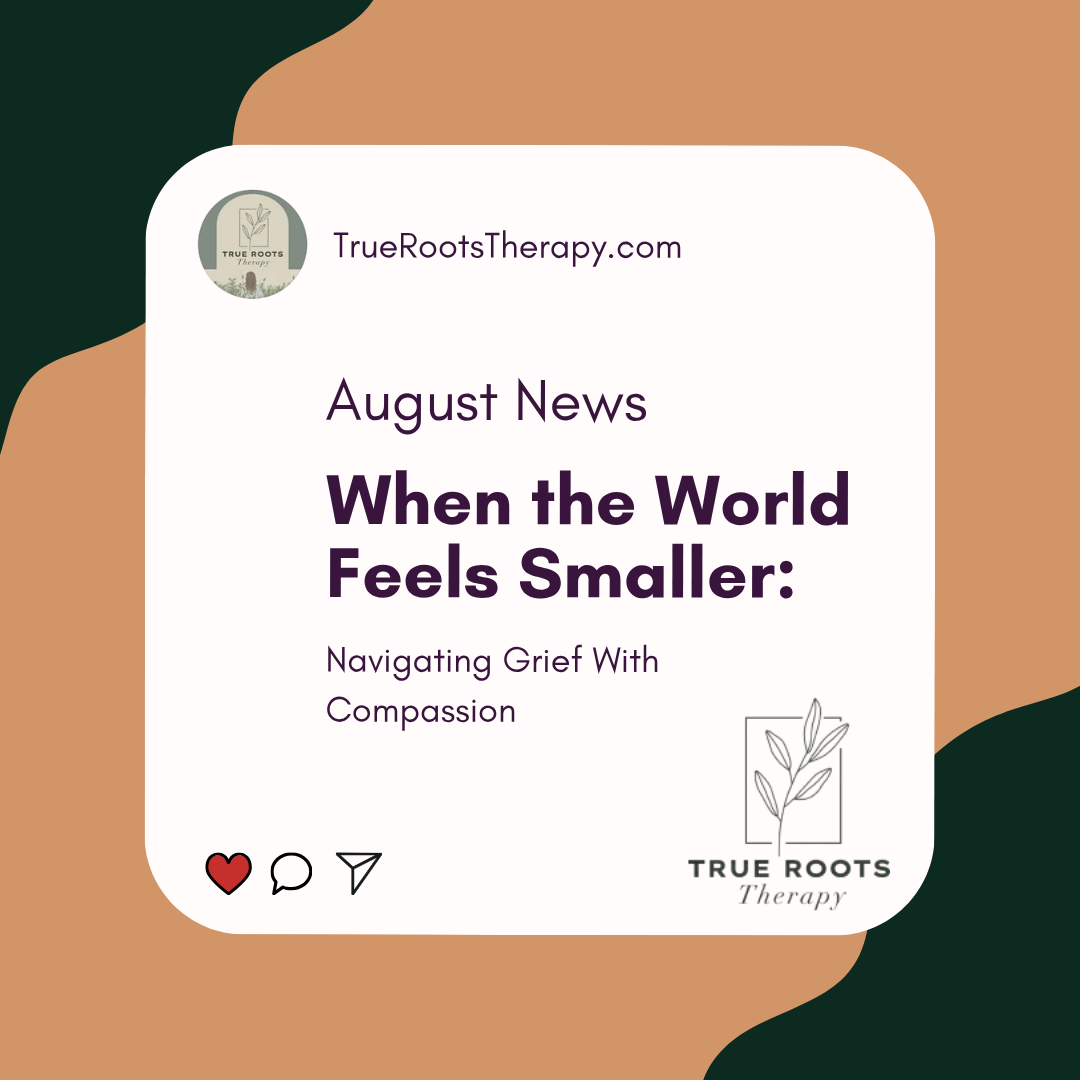 By Tiffany Martens, RP-Q | True Roots Therapy
By Tiffany Martens, RP-Q | True Roots Therapy
Grief can feel like a weight you’re expected to carry invisibly. It can shrink your world until even familiar places feel unfamiliar. I’m Tiffany Martens, a Registered Psychotherapist (Qualifying) at True Roots Therapy, and I want you to know that if you’re going through grief or loss, you are not alone. This journey is deeply personal, and none of your feelings are wrong.
Understanding Grief’s Many Forms
Grief is more than sadness. It can appear as anger, guilt, confusion or numbness. It manifests in longing for what was, profound fatigue, and restless sleep. It can also surprise you with waves of emotion when you least expect them.
Whether you’re mourning the death of a loved one, the end of a relationship, or another form of loss, your experience is valid. Loss doesn’t have to look dramatic to hurt profoundly. You might find yourself asking, ‘Why am I still this upset?’ or feeling like I should be over this by now. In my work, I see how grief is a natural response to loss and healing begins when we allow it space, time and compassionate support.
How Grief Affects You and Those Around You
Grief doesn’t just live in your heart. It touches relationships, home life and work. Concentration can falter, and decision-making can feel impossible. Every day interactions may feel overwhelming. You may sense a fog settling in.
Loved ones often want to help but worry they’ll say the wrong thing. They might withdraw, thinking they can’t support you properly. You might feel misunderstood or lonely even in a crowded room. Perhaps you find yourself nodding yes when someone says, “You’ll feel better soon.” That phrase might feel dismissive, leaving you feeling unheard and unseen.
Grief is messy. It doesn’t follow a neat timeline. Sometimes you may feel hopeful, and other times so low that joy seems impossible. These fluctuations don’t mean you’re weak—they tell you are navigating something deeply human.
Compassionate Approaches to Healing
At True Roots Therapy, our goal with grief counselling is to care and be straightforward. We won’t rush you. We won’t tell you to move on faster than you’re ready. We offer a safe, supportive space for you to express whatever you’re feeling without fear of judgment.
Here’s how we approach grief with compassion and purpose:
- Holding Space for All Emotions
- Practical Tools for Coping
- Narrative Exploration
- Family Dynamics
- Recognizing Non-Linear Progress
- Gentle Mental Health Support
Your feelings matter. As you process rage, guilt, relief or emptiness, it all counts. In therapy, we invite these feelings, examine them gently, and give them room to breathe.
Grounding exercises, breathing techniques, journaling prompts and gentle imagery can anchor you in moments of overwhelm. These tools are small but powerful ways to steady your nervous system and reconnect with your body.
Stories matter. We might explore significant memories, rituals or symbols that help you honour what was lost and integrate your experience into your ongoing life.
Grief often impacts the entire family system. We can facilitate conversations and exercises to support communication, understanding and emotional connection within your family unit.
There is no timeline for healing. Some days will feel easier than others. This is normal. Grief therapy helps you build resilience and trust in your rhythm.
If grief triggers depression, anxiety or self-harm thoughts, we integrate strategies from CBT, DBT and compassion-focused therapy to support your mental wellbeing alongside grieving.
What You Can Expect in Grief Counselling
When we work together, I begin by understanding your unique experience. What does your grief feel like? When does it arrive, and where do you feel it in your body? Maybe you carry it as tightness in your chest, aches in your back, or restlessness in your head.
Then we craft a grief journey together that reflects your pace and needs. We explore how grief is manifesting now and what tools might ease the journey. This might include ritual work, letter writing, or creative expression if that feels right for you.
We will also explore how grief affects your relationships. How does it change the way you connect or communicate with people? How can you care for yourself and those around you during this time? These discussions help build emotional safety and realistic expectations for both you and your loved ones.
Why This Work Matters
Grief is not only about loss, it’s also about love. All the love we feel comes with the potential for grief when change occurs. By acknowledging the depth of your feelings, you are honouring what was there.
Grief therapy doesn’t erase your pain, but helps you carry it with greater ease. It can guide you back to moments of calm, connection and hope. It can restore your ability to laugh, to create meaning, to open your heart again.
You Do Not Have to Grieve Alone
If you’re feeling lost, depleted or overwhelmed by grief, please reach out. Healing is possible, and grief therapy can support your path forward.
I offer in-person and virtual sessions throughout Ontario, welcoming individuals and families from all backgrounds. If you are ready to begin processing your grief in a safe, compassionate environment, please contact me today to book a free 20-minute consultation.
Let’s walk this path together. You do not have to walk it alone.

